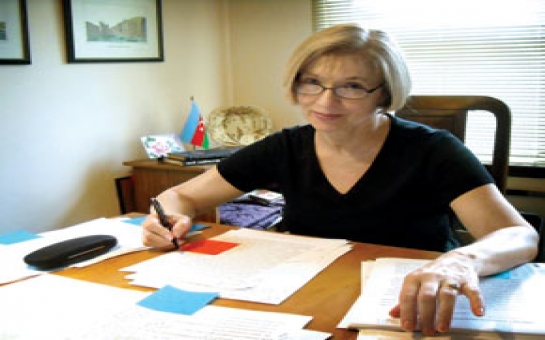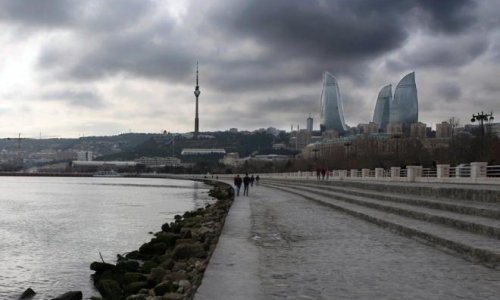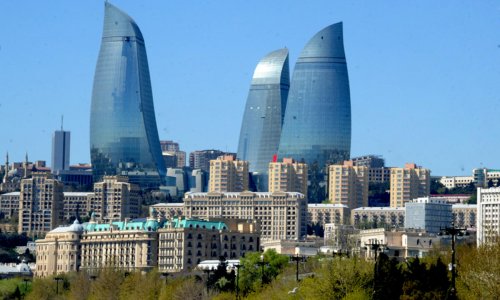Professor Audrey Altstadt on Azerbaijani history, culture wars and the word ‘Azeri’Audrey Altstadt was a pioneering researcher in Azerbaijan in 1980-81, even before its independence from the Soviet Union. She is best known for her 1992 book The Azerbaijani Turks: Power and Identity under Russian Rule. Now a professor of history at the University of Massachusetts Amherst, Audrey Altstadt continues her mission to study and inspire interest in the history of the region. Fellow American Jeffrey Werbock, an expert on Azerbaijani mugham music, interviewed Prof. Altstadt for Visions.How old were you when you first got interested in Azerbaijan and its history? What was your background when you discovered the country?I was a first year graduate student at the University of Chicago, so I was 21. I went there to study international relations and the first seminar I took was led by Prof. Alexandre Bennigsen who was the great specialist on ‘Soviet Islam’. His family had moved to Russia from the Baltic in the time of Peter the Great. They fled the Bolsheviks when he was a child and settled in Paris where he grew up and was educated… he was multi-lingual. In Paris during and after World War II, he knew many Azerbaijani émigrés, including Jeyhun Hajibeyli, as well as Russians and others. He was a visiting professor at Chicago for two terms each year and the rest of the time he was at the University of Paris. I was lucky to be trained by him. He persuaded me to go into history for my PhD and later he became the director of my doctoral dissertation.I had my undergraduate degree in Russian Language and Area Studies from the University of Illinois at Urbana-Champaign, in 1975. So I had good proficiency in Russian language and lots of background in Soviet and Russian history, politics and economics. In Prof. Bennigsen's seminar, we studied the non-Russian nationalities, especially the Muslim groups, including Azerbaijan. I wrote my first paper on Azerbaijan without knowing anything about the place or the people. I wrote another paper and then my master's degree thesis, gradually building on historical work and then-current analysis of Soviet census statistics. Information was very hard to get at that time and so much of the information was utterly misleading.Once the time came to decide about a PhD, Prof. Bennigsen told me that to work 'from the inside' I had to learn Azerbaijani, study Islamic, Iranian and Turkish history. Otherwise, with only knowledge of Russian and Marxism, I would always be an outsider. So I followed his prescription and started language study in 1977. I read every possible source on Azerbaijan available in the US until I went to Baku in 1980-81 on a year-long academic exchange.What was your experience there?I was there for doctoral research and had access to Azerbaijan State University (now Baku State University) and to the State Historical Archives. I believe I was the first American to work in those archives, and it was a privilege.Yet 1980 was a time of bad Soviet-US relations. President Carter had just boycotted the summer Olympics in Moscow because of the Soviet invasion of Afghanistan in late 1979. The Iran-Iraq War had just started and there were both Iranian and Iraqi consulates in Baku. It was a tense time and as an American in the city I was uncertain about conditions. I lived in a dormitory that was filled with students, mostly men, from Cuba, North Vietnam, North Korea and various African states. People thought I was German, but no one bothered me. I was followed, presumably by the local KGB, all the time, but I figured they would not let anything happen to me, so in an odd way it was not frightening. The local people were all very hospitable, even though associating with an American was potentially dangerous for them. My adviser, Prof. Suleiman Aliyarli, was very kind and helpful, although I learned many years later that he was under pressure to keep an eye on me and the things I did. We had good discussions of research problems and he had a desk set up for me in his departmental office. He had many dissertations, journal articles and books brought to me. He was very proud of my daily work while I was at the university. Others came to visit him and commented on how odd it was that I was always there reading! After a few months, I started working in the archives, which was a rare privilege.I struggled to use Azerbaijani, because of my three years studying Turkish. It was difficult since people wanted to make me at ease and they saw Russian was easier for me to speak. So we kept going back to Russian. Finally I met a few very patient people who let me construct sentences in Azerbaijani – it was excruciatingly slow, but after several months, I became proficient. By the time I left in the summer of 1981, my Azerbaijani was better than my Russian.Have you been back since? Do you plan to go back?I have visited Baku quite a few times since that first trip – in the mid 1980s, twice in the early 1990s after the collapse of the USSR when there was obvious unrest in Baku, and three times in the 2000s after life had settled down and modern buildings were being constructed. My last trip was in 2008 when I was able to spend almost every day in the archives gathering material for my Culture Wars book on the 1920-1940 period. Of course I plan to go back, although I am not sure when.What made you choose that period for your research?Initially, I was a student of the politics of the present, the 1970s with the Cold War, the Strategic Arms Limitation Talks (SALT), Henry Kissinger and all that. But as I wrote my undergraduate and graduate papers, I kept trying to understand how each situation got to be the way it was in the 1970s, and then how they got to be as they were in the 1960s, the 1950s and so on. I kept looking back in history, earlier and earlier, to find origins. At a certain point, I became interested in late imperial Russia, mainly the two to three decades before World War I, because it seemed to be the time when the conditions of the 20th century were established – the power relationships, the global industrial economy, the sense of national identity and, in Russia, the transition from the tsarist empire to the Soviet Union which, of course, still existed in the 1970s.My early reading on Baku history revealed that the books available in North America, in English or in Russian, were about the oil industry and the labour movement. Those topics focused on Russians, Armenians and foreigners, all of whom were important as oil company owners or investors. The Russians made up a large proportion of workers, but other Russians as well as Armenians were managers. These works, whether by contemporary travellers, oilmen, journalists, or by later US or Russian historians who studied Baku, were all written as if the Azerbaijanis were not there. Georgians and Jews were like ‘bit players’ in a movie, but not important except as socialists or labour leaders. Finally, there was an undifferentiated mass of Muslims. The natives were called ‘Tatars’. Their behaviour was ‘ignorant’, ‘treacherous’, etc., etc. It was such a stereotype and so obviously prejudiced that it made me wonder about the real story. I saw from data published in the imperial census of 1897 and then two city censuses of 1903 and 1913 that the tens of thousands of Azerbaijanis – then called Azerbaijanis or Turks in native sources – were increasingly literate, the range of jobs they held was more diverse than just the oil industry and their level of education was improving.These bits of information led me to try to understand what the Azerbaijani Turks of Baku were doing in the industrial period. Over time, especially once I learned enough Turkish to use Azerbaijani sources, I decided to study their identity, the relationship of the Islamic to Turkic components, how this shaped their sense of community, their efforts to gain some political power, at least in Baku. To refine a topic for Soviet research I had to stop in 1914 because archives were likely to be closed to an American who ventured beyond the imperial period. Moreover, once World War I began, so many other factors would come into play that I decided for the PhD dissertation it would be better to start with a more peaceful period, get the lay of the land, identify the main people and issues, and then move from there after I completed my degree.What is your point of view of that period? Do you think history is now judging that period?First, let me challenge the whole notion of ‘history judging’ that period or anything else! ‘History’ is not some disembodied entity that stands apart from the flow of human events and looks down making judgments, repeating itself, or any of the other clichés that non-historians often use as a short hand to talk about perspectives on history. From that point of view – changing perspectives and interpretations of historical periods – the pre-World War I era is deemed to be as important as ever by historians of Europe, Asia and the Middle East. I am currently finding more and more scholarly books and memoirs about the pre-war period, and these often study cultural history more than political, which has been so thoroughly documented and analysed.For Azerbaijan, it’s an exciting period. I am not done studying it. I have devoted the first chapter of my new book to that era and I would love to examine and analyse it in greater depth. I am deeply impressed by the remarkable generation of the pre-war decades who steered a cultural-enlightenment modernization movement, wrote poetry and plays, taught in schools, debated in the City Council, wrote for newspapers and more. These were the kind of men of letters we see in the European Enlightenment and their belief in democracy was inspired by European examples, but it did not mean abandoning their own culture and language or their religion. That generation clearly inspired the intellectuals of the 1960s-70s and could potentially be an important model for the post-Soviet elites.Can you make a concise statement of the book’s main focus? What would you like to emphasize?I have just completed the book which I am calling Culture Wars in Soviet Azerbaijan, 1920-1940. When the government of the Azerbaijan Democratic Republic fell to the Bolsheviks in April 1920, the elites who led that government either fought back, fled abroad or developed some modus vivendi with the new government. Those who stayed continued to pursue their modernist agenda in social reform, education and other areas of culture once they had lost political power. In some ways, the Bolsheviks looked like allies in the modernization campaign. For example, both the native elites and the Bolsheviks wanted to combat illiteracy, expand education, raise the social status of women and so on. I think that some Azerbaijanis, some of them inside the new government or even in the Bolshevik party itself, believed that the Bolsheviks’ goals were the same as theirs. But in fact, the goals were different, only the methods were similar. So the two factions struggled over control of the modernization process. In some areas, the clashes began later than in others. In alphabet change, specifically the adoption of the Latin script, the regime and the native elites were in agreement for many years into the mid-1920s and the script was changed from Arabic to Latin. Only later were Russian words imposed and then, in 1940, the Cyrillic script. In university reform, however, the regime quickly cracked down on the one institution that embodied the independence of native intellectuals, since they were considered a threat. The university came under attack in May 1920 and was eventually dismantled in the early 1930s. It was re-established, but then as a thoroughly Soviet institution.One of my goals in writing this book was to document for the Azerbaijanis themselves some of the cultural policies which the Soviet regime put into place, and the struggles of indigenous elites against them. By the mid-1930s, the regime had won and the official policies shaped the rest of the 20th century language, education and literature of Azerbaijan. That is the legacy that today’s Azerbaijanis have inherited.I wanted to illustrate connections among people and institutions that might not have been the topic of study by Azerbaijani scholars – and I say this after many conversations with colleagues in Baku and knowing how much new scholarship has been done in the post-Soviet period. I have much respect for my colleagues in Baku. It’s simply that our training is different and a US historian will tend to ask different types of questions than an Azerbaijani historian.I hope to enter some of the debates they have themselves, for example, the conflicting views about Dr Nariman Narimanov. He was an influential playwright and educator in the 1890s, became a medical doctor in the 1900s and also a Bolshevik. He headed the first Soviet government of Azerbaijan in 1920. But I have seen documents that show he began to criticize other party leaders like Ordzhonikidze. I believe that his view of socialism was as a form of anti-imperialism, not a tool for the dominance of the Russian proletariat. His political and cultural actions should be seen in that light. There are many such questions that are fruitful areas for research and debate. What is your opinion of other books on Azerbaijan, especially those by Tadeusz Swietochowski, Svante Cornell and Thomas Goltz?I have read all their books and many articles. I have known them all for many years as colleagues and friends. We come at the study of Azerbaijan from different directions and our background gives each of us and our work a distinctive flavour. Each of our books has its own strengths and fills a certain niche in Western study of Azerbaijan. We respect each other’s work and refer to it in our own.Do you plan to write anything else?Of course! That’s what I do – I am a scholar of Azerbaijan’s history. I plan to write a political biography of Jeyhun Hajibeyli, which allows me to study problems of Azerbaijani history that unfolded outside Azerbaijan. First, Jeyhun bey was involved in anti-Bolshevik movements in Europe, but he was very careful because of his brother Uzeyir, the great composer, who was still living in Soviet Azerbaijan. During the Cold War, especially after Uzeyir’s death, Jeyhun became more of a public figure and was involved with émigré groups and with the creation of Radio Liberty. I was able to interview a couple of Americans who knew him in the 1950s.After that biography is done, I would like to return to the realm of literary politics of the interwar period that my Culture Wars book deals with in the final chapter. I have been reading the poems of Samed Vurghun and I would like to try to translate some of them, for discussion of their importance in shaping identity. These are such complex and moving poems that I want to work on them and their impact on shaping the modern Azerbaijani language as well as identity. I think the entire genre of ‘homeland poetry’ as I call it is very influential, but I don’t know what sort of research has been done on this so far. I have lots to read before I am ready for that! Where do you teach? Do your courses cover Azerbaijan?I am a professor of history at the University of Massachusetts Amherst and I have been here for over 20 years. I was hired in 1990 to teach Soviet history and just a year later, the USSR collapsed… For my classes, because I teach Eurasia, I have to teach students both the usual methods and ideas for historians – how to find and evaluate sources, how to ‘interrogate the sources’ and how to question your own assumptions etc. But for my field, I also have to teach the students how to think about and learn about a society that is on the other side of the world and remote in time. The assumptions they bring to history, things they consider ‘natural’ or ‘human nature’ may not be valid in the study of another society. So we read, we discuss, we challenge each other (mostly I challenge them, but eventually they learn to do it by themselves) and struggle through the material and their thinking. In the end, I want them to do what professional historians do, produce document-based, culturally-aware, analytical scholarship.My courses are not solely on Azerbaijan, but I have developed a few courses that allow me to spend more time on Azerbaijan than on a general history of the USSR or the Russian Empire. One course that I have been teaching for several years is Oil, Human Rights and Democratization in Eurasia. It is an advanced course and deals mainly with oil and human rights issues in the Caspian region. We also examine the historical and political context of oil extraction and transport as well as the politics of the last 25 years. I get interesting students, including former and future military officers. I also invite guest speakers from the Petroleum Institute and retired State Department officers. It is exciting and a little different each time I teach it.Is there anything you would like to add?I would like to comment on some cultural-historical issues that have become controversial in the post-Soviet era. One is the use of the neologism ‘Azeri’ to refer to the people and language of Azerbaijan. I worked a long time to trace the native elite’s names for the local people, land and language on the basis of published sources in the 19th century. Clearly, there was no standard, universally accepted term. The Russians used the term ‘Tatar’ for all settled (non-nomadic) Turkic speakers. This was just a mistake and the use of Tatar does not appear in Turkic-language materials. The native elites used terms ‘Azerbaijani’, ‘Turk’, ‘Azerbaijani Turk’, ‘Caucasian Turk’ and sometimes ‘Muslim’. By the early 20th century the most common use was ‘Azerbaijani’. After 1908, the year of the Young Turk Revolution in the Ottoman Empire, the most common term became ‘Turk’. And ‘Turk’ remained the standard term into the period of the Republic and the Soviet period. Only in 1937, for the sake of separating various Turkic speakers from one another, did the Soviet regime ban the use of ‘Turk’ and insist on ‘Azerbaijani’ as the name of the people and the language. Looking back only to 1937, later Azerbaijanis believed the term was a Stalinist invention and began to resist it. But in fact, it was an internally created term. The 1937 policy was merely returning society to its pre-1908 convention.So where did ‘Azeri’ come from? Nowhere in the indigenous publications of books, plays, poetry or newspapers have I found it. I suspect it was invented in emigration, specifically in Europe in the interwar period. Émigrés in the US had supported this idea. Perhaps it developed because the word ‘Azerbaijani’ was considered too long or difficult for Europeans and they or the émigrés allowed this short form. I can’t imagine another people who let foreigners decide their name for them! The only people who use it today are foreigners and those Azerbaijanis who have lived abroad. I know that many colleagues in Baku do not appreciate it. I once used it in conversation with an Azerbaijani scholar in the US and he reached across the table, touched my arm and said, Please don’t use that word. Don’t take away from us the name of our land.I was so touched by that request, that I never used ‘Azeri’ again. And now that I have traced the usage myself, I have tried to explain the origin of the term ‘Azerbaijani’ (as well as ‘Turk’ in this context) and I urge people to use ‘Azerbaijani’ as the form that developed within the country itself.
As for the use of this beautiful Turkic language, I am sorry to hear educated young Azerbaijanis speak Russian among themselves. (English has not caught on in the same way). I understand that those who were educated in Russian may not be comfortable in Azerbaijani, but that practice leads to the weakening of their native language, the loss of knowledge and use of vocabulary and the marginalization of it by a segment of the educated. Culturally and intellectually, that is their loss. Azerbaijani Turkic is a rich and nuanced language with a long literary tradition. It is not confined to the village or the kitchen and losing it means losing touch with one’s own history. Appreciating the language, literature and culture of one’s neighbours is a fine thing, but it is different from denying the strength and beauty of one’s own culture. Language and its use are part of modern Azerbaijani identity. As the elites of the pre-war era believed, that identity can be modern, secular, technologically savvy, but it need not abandon the homeland, the hearth, the language and literature. To quote Samed Vurghun – Ayrılarmı könül candan? Can one separate the heart from the soul? This rhetorical question goes to the heart of Azerbaijan’s modern identity. The young generation has choices, and I hope some – many, in fact – will work to preserve their own country’s history and culture.
(Visions.az)
ANN.Az











